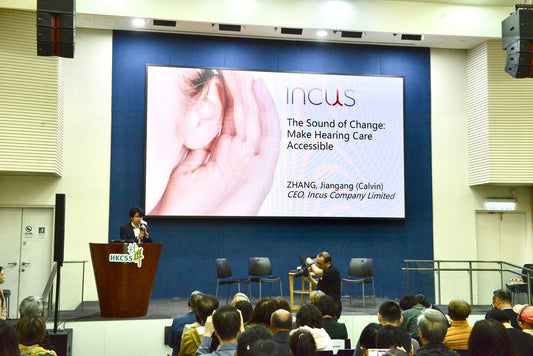Tinnitus is by no mean a rare medical condition. Patients with tinnitus hear ringing sounds, which originate within the ear or brain and do not come from the outside world. Around 5% of the population are diagnosed with tinnitus, but the percentage among seniors sits exceptionally high at 25%. While most people would love a solution, they don’t know what or how to treat tinnitus. In this article, we will explain tinnitus and introduce the top eight tinnitus treatments.
Tinnitus
A solid understanding of what tinnitus is is the first step toward treating it.
Tinnitus is often perceived as ringing in the ear, which makes patients feel annoyed, anxious, and unable to sleep and focus. Sometimes, the tinnitus comes in the form of humming, hissing, roaring, screeching, buzzing or clicking sounds.
The common causes of tinnitus include ageing, exposure to loud noise, drug intoxication and chronic ear disorder, with ageing being the most prominent cause due to age-related hearing loss.
Temporary Tinnitus
Sometimes, we can temporarily experience tinnitus.
That could happen when, for example, taking a flight, riding an escalator or hiking.
In these cases, the tinnitus will usually subside after completing the activity, and there is no need to be concerned.
Permanent or Long-Term Tinnitus
If you have long-term tinnitus symptoms and your daily life has been deeply affected, please seek medical help immediately, and pay attention to the following four points to help the healthcare professional understand the situation:
- Do you hear the tinnitus in one ear (unilateral) or both ears (bilateral)?
- What does your tinnitus sound like? Is it a ringing sound? Buzzing? Or, perhaps, clicking? And is the sound continuous or intermittent?
- How frequently do you experience tinnitus, and how long does it last? Are there any situations or times of the day where tinnitus is more likely to occur?
- What effects are tinnitus having on your daily life?
Habituating to Tinnitus
Most people who suffer from permanent tinnitus will habituate to it. Habituation refers to the process of becoming used to certain emotions or feelings. It is analogous to how when we first wear our clothes in the morning, we can feel them touch our skin, but within a short amount of time, our brain will start to ignore them, because it realises that these stimuli are not relevant.
Habituation is one of the most common outcomes of tinnitus. When applied to tinnitus, habituation means our mind gradually gets used to the feeling of tinnitus to a point where we no longer perceive or are bothered by the sounds.
Around 80% of people with tinnitus successfully habituate.
Typically, it takes around one year to reach habituation.
While most people with tinnitus eventually habituate, it is important to seek out the cause and severity as soon as possible, so that proper treatment could be given.
Tinnitus Treatments
When treating tinnitus, it is important to keep the following concept in mind:
We should treat tinnitus as a symptom. The aim is to reduce the symptoms, rather than treating tinnitus as a disease or trying to cure it.
Besides, there is no universal way to treat tinnitus. One treatment method may work well for some but not be effective for other people.
The Top Eight Tinnitus Treatments
There are many treatments for tinnitus. Here are eight of the treatments and how they work.
- Strengthen psychological construction and counselling:
- Know that tinnitus generally will not lead to hearing loss or total deafness.
- Try not to fear tinnitus or be anxious about it.
- Try to coexist with tinnitus peacefully.
- Avoid unnecessary anxiety and stressful situations in your life.
- Avoid exposure to items and scenarios that trigger the tinnitus:
- Avoid excessive consumption of pungent foods such as coffee, tea, peppers, etc.
- Avoid long-term exposure to noisy environments.
- Avoid excessive fatigue and get enough sleep and rest.
- Avoid using headphones or walkman earplugs to listen to music, MP3 or CD.
- Pharmacological Treatment: Sometimes, mild tranquilisers (psychosomatic agents) are prescribed to reduce the anxiety and insomnia caused by tinnitus. Another form of pharmacological treatment is to use nerve activators to improve brain circulation or blood circulation in the inner ear and auditory nerve. Vitamins may also help.
- Neurofeedback: The purpose of neurofeedback is to instruct patients to learn how to release their stress and tension. It can be effective for patients whose tinnitus has affected their daily routine. Neurofeedback involves body relaxation techniques, such as deep relaxation exercises and massage of acupoints. It is mainly used to relax the tension of the muscles and nerves from the whole body to improve blood circulation, moderate inhalation and improve breathing.
- Tinnitus retraining method: Tinnitus retraining therapy is a popular method, especially in Europe. It combines low audio frequency and continuous background sound with face-to-face direct psychological consultation and guidance with patients. A hearing aid with a sound generator will be used to provide the background sound continuously and it must be worn for at least 8 hours a day. Combined with counselling and guidance, this method aims to help patients get used to their tinnitus. The results are claimed to be good, but it can take twelve months or longer to see the effects.
- Injection of anaesthetics or steroids: Tinnitus could disappear temporarily by injecting anaesthetics or steroids into the middle ear cavity. However, it is not a long-lasting effect and the impacts on patients are still under research.
- Ear surgery: With the current development of medical technology, the use of surgery to treat tinnitus is the last method to be considered. It is only suitable for a very small number of cases, such as acoustic neuroma surgery or cochlear implant surgery. It is not suitable for general tinnitus patients.
- Alternative therapies: Some alternative treatments include: low-intensity lasers, traditional medicinal treatment, acupuncture treatment, electromagnetic wave treatment, hyperbaric oxygen treatment and hypnotherapy.
Speaking of therapies, sound therapy can also be applied in treating tinnitus, which is a more relaxing and effortless way of dealing with tinnitus.
Tinnitus Sound Therapy
Sound therapy involves exposing the patient to passive auditory stimuli, by listening to music continuously until the brain ignores tinnitus. After some time, patients can try to pay attention to the tinnitus for a while and then resume focusing on the music.
The purpose of this repetition is to divert attention away from the tinnitus, so the patient would get the ability to shift attention from tinnitus to other things at any time while allowing the brain to adapt tinnitus as a background sound. This way, the patient may become able to actively suppress or even ignore other inadvertent sounds.
Conclusion
While tinnitus is often treatable, we should still prioritise protecting our ears. Ageing, prolonged exposure to loud noise, drug intoxication and chronic ear disorders are the main causes of tinnitus. We need to make sure that we are hearing well and clear, and seek help from healthcare professionals when noticing persistent tinnitus or hearing problems, so that treatments could be given in time.



